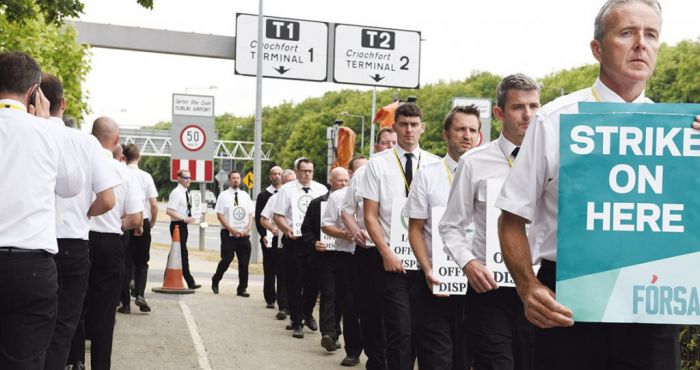By Michael O’Brien
The granting of Ryanair’s injunction against the pilot’s democratically balloted scheduled strike action tomorrow and Friday is an attack on workers’ rights by the judiciary that should concern the whole trade union movement. It should not however come as a surprise as the judiciary as part of the capitalist establishment has a natural class bias in favour of the bosses in these situations, as has been demonstrated time and again.
The injunction application by Ryanair and reasoning behind the judgement, which is provisional pending a full hearing, is bogus from start to finish. The strike action had the overwhelming support of the directly employed pilots who are members of the union. The fact that there is a significant cohort of pilots not yet organised into the union is a reflection of the fact that they are in an insecure bogus ‘self-employment’ relationship with the company and not satisfaction with their wages and conditions which are inferior to their directly employed colleagues.
Secondly, Ryanair has led the workers on a merry dance over the year since the last strike action. The idea that the union have rushed into this action without exhausting the ad procedures brokered a year ago is a joke. Ryanair showed clearly they not going to engage on pay putting the ball firmly in the court of the workers and their unions to respond.
It is no coincidence that action is either underway or pending among Ryanair workers in Portugal, Spain and Britain. The moves by the Ryanair workers and their unions in Belgium to cut across efforts by the employer to use workers there to engage in effective strike breaking activity is welcome.
Faced with the possibility of industrial action by pilots in late 2017, Ryanair balked and after three decades of resistance conceded the principle of trade union recognition. The fact that this was achieved across the continent in the wake of strong organising efforts is a great example to all workers who are employed by transnational companies that they are not omnipotent but can be taken on if workers co-ordinated struggle across borders.
While the achievement of recognition remains an important breakthrough it is clear that gaining on pay and conditions for pilots, cabin crew and ground staff will not come without further struggle. The last two years have been characterised by heel dragging and a lack of serious engagement by the company.
Without recklessly leaving the union open to being fined by the courts a route to mounting strike action with the shortest possible delay must be supported by the whole trade union movement. A message should be sent to the judiciary and government that the workers movement will not meekly accept employer injunctions being used to curtail effective action by workers. It is also imperative that the trade union movement take decisive action to demand the repeal of the draconian measures in the 1990 Industrial Relations Act that are used to hamper effective worker action.












